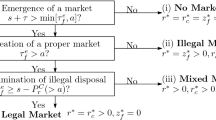Abstract
A system requiring a waste management license from an enforcement agency has been introduced in many countries. A license system is usually coupled with fines, a manifest, and a disposal tax. However, these policy devices have not been integrated into an optimal policy. In this paper we derive an optimal waste management policy by using those policy devices. Waste management policies are met with three difficult problems: asymmetric information, the heterogeneity of waste management firms, and non-compliance by waste management firms and waste disposers. The optimal policy in this paper overcomes all three problems.
Similar content being viewed by others
References
Becker G. S. (1968) Crime and punishment: An economic approach. Journal of Political Economy 76: 169–217
Bolton P., Dewatripont M. (2005) Contract theory. The MIT Press, Cambridge
Hanley N., Shogren J. F., White B. (1997) Environmental economics in theory and practice. Oxford University Press, Oxford
Harrington W. (1988) Enforcement leverage when penalties are restricted. Journal of Public Economics 37: 29–53
Heyes A. (1993) Environmental enforcement when inspectability is endogenous. Environmental & Resource Economics 4: 479–494
Heyes A. (2000) Implementing environmental regulation: Enforcement and compliance. Journal of Regulatory Economics 17: 107–129
Ishiwata M. (2002) The industrial waste connection (in Japanese). Wave Publishers, Tokyo
Kaplow L., Shavell S. (1994) Optimal law enforcement with self-reporting of behavior. Journal of Political Economy 102: 583–606
Khambu J. (1989) Regulatory standards, compliance and enforcement. Journal of Regulatory Economics 1: 103–114
Macho-Stadler I., Pérez-Castrillo D. (2006) Optimal enforcement policy and firms’ emissions and compliance with environmental taxes. Journal of Environmental Economics and Management 51: 110–131
Malik A. S. (1993) Self-reporting and the design of policies for regulating stochastic pollution. Journal of Environmental Economics and Management 24: 241–257
Ministry of the Environment, Japan. (2005). The criteria for superior industrial waste management firms (in Japanese). Ministry of the Environment, Tokyo. http://www.env.go.jp/recycle/report/h17-01.pdf.
Ministry of the Environment, Japan. (2008). Annual reports on illegal disposal or improper treatment of industrial waste in Japan (in Japanese). Ministry of the Environment, Tokyo. http://www.env.go.jp/press/press.php?serial=10609.
Sandmo A. (2002) Efficient environmental policy with imperfect compliance. Environmental and Resource Economics 23: 85–103
Shavell S. (1986) The judgement proof problem. International Review of Law and Economics 6: 45–58
Sigman H. (1998) Midnight dumping: Public policies and illegal disposal of used oil. RAND Journal of Economics 29: 157–178
Author information
Authors and Affiliations
Corresponding author
Rights and permissions
About this article
Cite this article
Shinkuma, T., Managi, S. License scheme: an optimal waste management policy under asymmetric information. J Regul Econ 39, 143–168 (2011). https://doi.org/10.1007/s11149-010-9136-x
Published:
Issue Date:
DOI: https://doi.org/10.1007/s11149-010-9136-x




